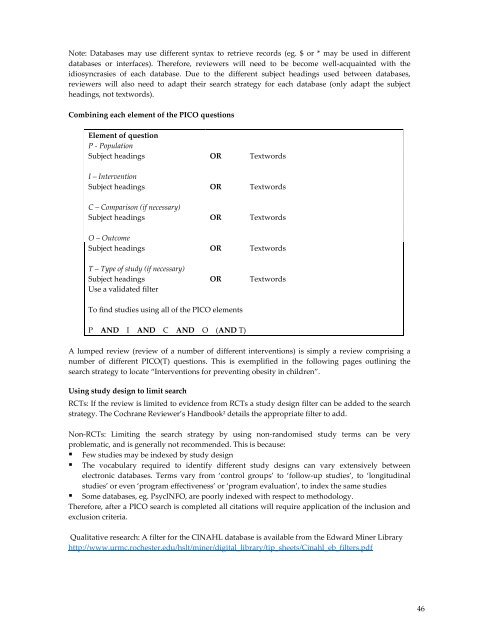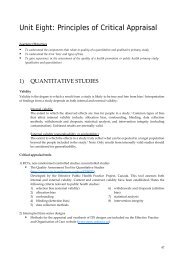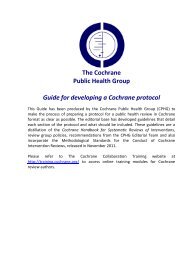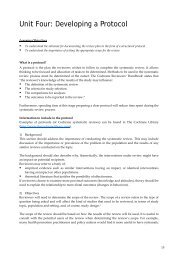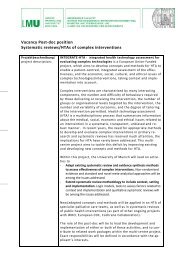Train the Trainer Course book - Cochrane Public Health Group
Train the Trainer Course book - Cochrane Public Health Group
Train the Trainer Course book - Cochrane Public Health Group
Create successful ePaper yourself
Turn your PDF publications into a flip-book with our unique Google optimized e-Paper software.
Note: Databases may use different syntax to retrieve records (eg. $ or * may be used in different<br />
databases or interfaces). Therefore, reviewers will need to be become well-acquainted with <strong>the</strong><br />
idiosyncrasies of each database. Due to <strong>the</strong> different subject headings used between databases,<br />
reviewers will also need to adapt <strong>the</strong>ir search strategy for each database (only adapt <strong>the</strong> subject<br />
headings, not textwords).<br />
Combining each element of <strong>the</strong> PICO questions<br />
Element of question<br />
P - Population<br />
Subject headings OR Textwords<br />
I – Intervention<br />
Subject headings OR Textwords<br />
C – Comparison (if necessary)<br />
Subject headings OR Textwords<br />
O – Outcome<br />
Subject headings OR Textwords<br />
T – Type of study (if necessary)<br />
Subject headings<br />
Use a validated filter<br />
OR<br />
Textwords<br />
To find studies using all of <strong>the</strong> PICO elements<br />
P AND I AND C AND O (AND T)<br />
A lumped review (review of a number of different interventions) is simply a review comprising a<br />
number of different PICO(T) questions. This is exemplified in <strong>the</strong> following pages outlining <strong>the</strong><br />
search strategy to locate “Interventions for preventing obesity in children”.<br />
Using study design to limit search<br />
RCTs: If <strong>the</strong> review is limited to evidence from RCTs a study design filter can be added to <strong>the</strong> search<br />
strategy. The <strong>Cochrane</strong> Reviewer’s Hand<strong>book</strong> 2 details <strong>the</strong> appropriate filter to add.<br />
Non-RCTs: Limiting <strong>the</strong> search strategy by using non-randomised study terms can be very<br />
problematic, and is generally not recommended. This is because:<br />
Few studies may be indexed by study design<br />
The vocabulary required to identify different study designs can vary extensively between<br />
electronic databases. Terms vary from ‘control groups’ to ‘follow-up studies’, to ‘longitudinal<br />
studies’ or even ‘program effectiveness’ or ‘program evaluation’, to index <strong>the</strong> same studies<br />
Some databases, eg. PsycINFO, are poorly indexed with respect to methodology.<br />
Therefore, after a PICO search is completed all citations will require application of <strong>the</strong> inclusion and<br />
exclusion criteria.<br />
Qualitative research: A filter for <strong>the</strong> CINAHL database is available from <strong>the</strong> Edward Miner Library<br />
http://www.urmc.rochester.edu/hslt/miner/digital_library/tip_sheets/Cinahl_eb_filters.pdf<br />
46


